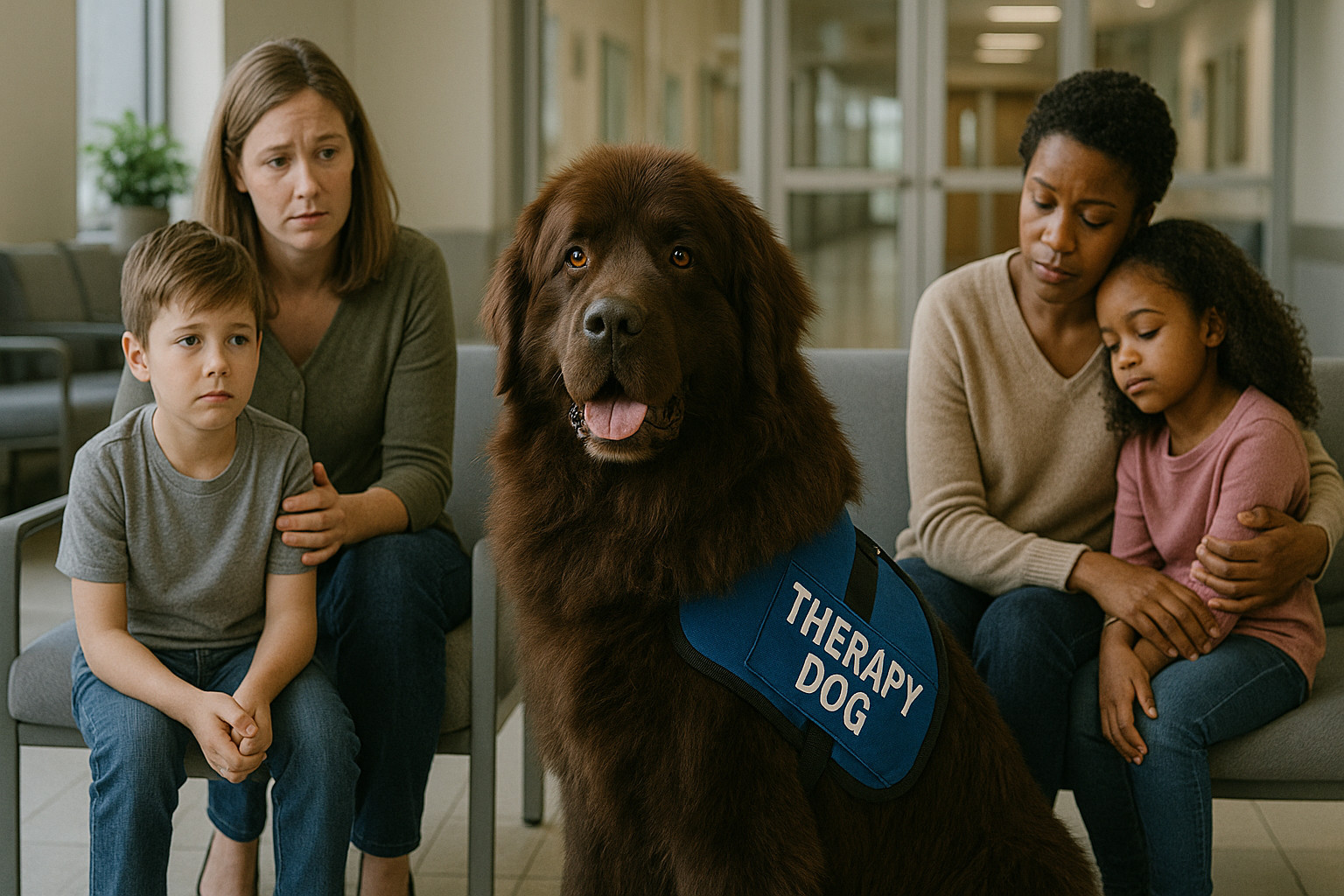Newfoundland as a Therapy Dog

Newfoundland as a Therapy Dog Overview
The Newfoundland is a breed renowned for its gentle demeanor, intelligence, and willingness to please. As a therapy dog, these traits, along with its physical and emotional intelligence, allow it to forge strong therapeutic connections with people. This comprehensive exploration examines the Newfoundland's aptitude for therapy work, delving into aspects such as temperament, environments, health factors, and training requirements.
Understanding the Therapy Dog Role
Therapy dogs provide comfort, emotional support, and companionship to individuals in various settings. These dogs often visit hospitals, schools, nursing homes, and rehabilitation centers, where they interact with people of all ages. The Newfoundland's role as a therapy dog hinges on its ability to connect empathically, remain calm in stimulating environments, and offer unwavering support to those in need.
Physical Appearance and Energy Level
The Newfoundland is a large, powerful dog with a striking appearance characterized by a broad head, thick double coat, and deeply set, expressive eyes. Despite their size, which can be intimidating to some, they are known for their calm demeanor. Their moderate energy level complements their work as therapy dogs, as they manage to maintain composure and serenity, even amidst bustling environments.
- Size and Strength: Their impressive size can provide a comforting presence, yet it requires handlers to be attentive to space constraints in therapy settings.
- Energy Balance: Newfoundlands have a steady energy level conducive to prolonged sessions of interaction, without displaying signs of restlessness.
Personality and Emotional Intelligence
Newfoundlands are often described as gentle giants, embodying patience, tolerance, and an innate sense of empathy. Their emotional intelligence is profound; they are adept at perceiving human emotions and react appropriately, providing either affection or a calming presence depending on the situation.
- Empathy and Intuition: This breed is exceptionally good at sensing and reacting to emotional states, an invaluable trait in therapy contexts.
- Social Adaptability: They adapt quickly to different social scenarios, making them versatile in therapeutic environments.
Environments Where Newfoundland Excels
The Newfoundland thrives in environments where their nurturing nature and calm disposition can shine. Their presence is particularly beneficial in spaces where emotional reassurance is paramount.
- Hospitals and Healthcare Facilities: Their calming presence can significantly impact patients, reducing anxiety and providing a sense of normalcy and comfort.
- Educational Settings: In schools, their patient demeanor makes them excellent for interacting with children, especially those who have special needs or emotional challenges.
- Rehabilitation Centers: Their supportive nature aids in recovery and encourages participation in therapy sessions.
Common Therapy Settings
In therapeutic environments, Newfoundlands excel due to their ability to remain composed under stress and their dedication to interacting positively with individuals.
- Nursing Homes: The breed's gentle nature translates well to elderly care, providing companionship and reducing feelings of loneliness among residents.
- Counseling and Psychological Services: Their empathetic nature supports individuals undergoing emotional or mental health challenges.
Interactions with Different Populations
Newfoundlands possess versatile interaction capabilities, adjusting their behavior according to the needs of different populations.
- Children: With children, particularly those with developmental challenges, they exhibit patience and encourage engagement and play.
- Adults with Disabilities: Their assistance ranges from offering companionship to inspiring confidence in therapeutic tasks.
- Seniors: They offer gentle interaction and the capacity to engender fond memories and ease loneliness.
Health and Wellness Factors
A Newfoundland's wellness directly impacts its ability to perform therapy duties effectively. Their health needs to be monitored due to their predisposition to certain conditions.
- Lifespan and Common Health Issues: With a lifespan of 8 to 10 years, common health issues include hip dysplasia, heart conditions, and joint problems, all of which require careful management.
- Grooming Needs: Regular grooming is essential to maintain their coat and overall health, ensuring cleanliness during therapy visits.
Maintenance and Care Needs
Proper maintenance and care are crucial for a Newfoundland therapy dog to remain effective and safe in its role.
- Diet and Exercise: A balanced diet and controlled physical activity help maintain their weight and health, vital for reducing stress on joints.
- Regular Veterinary Care: Consistent medical check-ups are necessary to manage any potential health complications.
Training and Certification Readiness
Training a Newfoundland for therapy work involves cultivating its natural tendencies toward gentleness and receptivity to training.
- Learning Style and Responsiveness: Intelligent and eager to please, Newfoundlands typically respond well to positive, reward-based training methods.
- Social and Emotional Stimuli Handling: These dogs handle social and emotional stimuli with grace, rarely showing signs of stress or discomfort.
Strengths, Limitations, and Ideal Roles for Newfoundland
The Newfoundland's strengths include their empathy, stability, and soothing physical presence. However, their size and potential health issues may limit certain activities.
- Strengths: Their calm nature and capacity for empathy make them ideal candidates for emotional support roles.
- Limitations: Space constraints and mobility can be an issue in some therapy environments due to their size.
Final Thoughts
Newfoundlands provide an impressive combination of traits that make them especially suited for therapy work. Their empathy, patience, and intelligence contribute significantly to their effectiveness in supporting individuals across various therapeutic environments. Careful attention to their health, grooming, and training ensures that they can continue to positively impact those in need.
Key Takeaways for the Newfoundland as a Therapy Dog
- Best suited for: Hospital, nursing home, educational, and rehabilitation center settings.
- Not ideal for: Therapy environments with limited space or those requiring intense physical activity.
- Temperament highlights: Empathy, patience, calmness, and adaptivity.
- Care and health notes: Requires regular grooming and health check-ups due to size-related health challenges.
- Therapy environments where they shine: Hospitals, schools, nursing homes, and counseling centers due to their calming and supportive nature.











